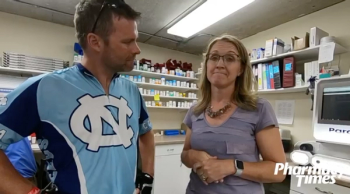
Community/Retail


Florajen Probiotics announces plans to expand consumer access by increasing product availability at Walgreens and Duane Reade stores nationwide.

The test is the first of its kind to secure FDA approval.

A total of 85% of AMBER study participants (308/362) achieved virologic suppression (viral load

The recalls and returns will be managed by the respective distributors separately, according to a press release from the company.

The FDA has approved Sandoz’s biosimilar adalimumab, Hyrimoz (adalimumab-adaz) for the treatment of rheumatoid arthritis, juvenile idiopathic arthritis, psoriatic arthritis, ankylosing spondylitis, adult Crohn disease, ulcerative colitis, and plaque psoriasis.

The expanded indication marks the first time an anti-PD-1 regimen has been approved in the first-line setting as both combination and monotherapy for squamous NSCLC, regardless of tumor PD-L1 expression status.

The CDC offers 7 tips to avoid any health scares this season.

The action, FDA officials explained in a press release, is based on new data that suggest there is no longer a reasonable certainty that there is no harm from the use of lead acetate as a color additive.

This new indication also applies to the fixed-dose combinations of canagliflozin/metformin HCl (Invokamet) tablets and canagliflozin/metformin HCl extended-release (Invokamet XR) tablets.

Avelumab, an immune checkpoint inhibitor, in combination with axitinib, a tyrosine kinase inhibitor, significantly improved progression-free survival in untreated renal cell carcinoma.

Three hospitals made significant progress in reducing deaths associated with poor quality health care.

According to TherapeuticsMD, Bijuva is the first and only FDA-approved bio-identical hormone therapy combination of estradiol and progesterone in a single, oral capsule for the treatment of moderate to severe vasomotor symptoms due to menopause in women with a uterus.

Despite a decline in the rate of opioid prescribing, the CDC reports that the number of opioid related deaths continues to rise. The pharmacology and pharmacokinetics of prescription and illicit fentanyl could help to shed light on why the opioid epidemic has taken the path that it has.

Costume contact lenses are gaining popularity, but there are concerns with these products.

Having a pharmacy that truly matters can make all the difference in the world to your patients, and to your bank account.

In the lexicon of management, the owner is the epitome of leadership. Yet surprisingly, according to the Harvard Business Review, little is known about this unique role.

Officials with the FDA have approved Jazz Pharmaceuticals' Xyrem (sodium oxybate) for the treatment of cataplexy and excessive daytime sleepiness (EDS) in pediatric patients aged 7 to 17 years with narcolepsy.

In this series, Jill Drury, PharmD, a clinical pharmacy specialist, provides patients with "Brown Bag" consultations. Patients bring to the pharmacy their current medications and over-the-counter products, giving the pharmacist an additional resource for pharmaceutical counsel. In this video, a patient with fair skin is planning a tropical vacation. She seeks advice about topical skin protection and potential adverse effects from the sun with her medications.

Several studies represent some of the important clinical trials in the treatment of Non-Hodgkin's Lymphoma.

Tildrakizumab-asmn (Ilumya), an injectable interleukin-23 (IL-23) inhibitor, was approved by the FDA in March for adults who are candidates for systemic therapy or phototherapy.

This weekly video program provides our readers with an in-depth review of the latest news, product approvals, FDA rulings, and more. Our Week in Review is a can't miss for the busy pharmacy professional.

A antiviral has been FDA-approved, just in time for flu season.

Any woman who has tried being both a full-time mother and a full-time student can tell you that is not an easy task.

Amgen will make evolocumab (Repatha) available at a list price of $5850, a 60% reduction from its annual list price of $14,1000.

Drug manufacturers, patient advocates, and professional organizations are giving a big thumbs-up to the SUPPORT for Patients and Communities Act.

Officials with the FDA have approved baloxavir marboxil (Xofluza, Shionogi) for the treatment of acute uncomplicated influenza in patients aged 12 years and older who have been symptomatic for no more than 48 hours.

Panelists will discuss and collaboratively provide an overview of medical cannabis, identify the therapeutic role of cannabis, examine the regulation of medical cannabis and establish the role of health care providers in prescribing medical cannabis.

Breckenridge Pharmaceutical's Clobazam Tablets, CIV, generic for Onfi® Tablets (Lundbeck), has been granted FDA approval for the adjunctive treatment of seizures associated with Lennox-Gastaut syndrome (LGS) in patients aged 2 years and older.

Beginning in spring 2019, all Walgreens pharmacies that do not offer a safe medication disposal kiosk will stock a take home safe medication disposal kit in the pharmacy that will be available at no cost upon patient request.